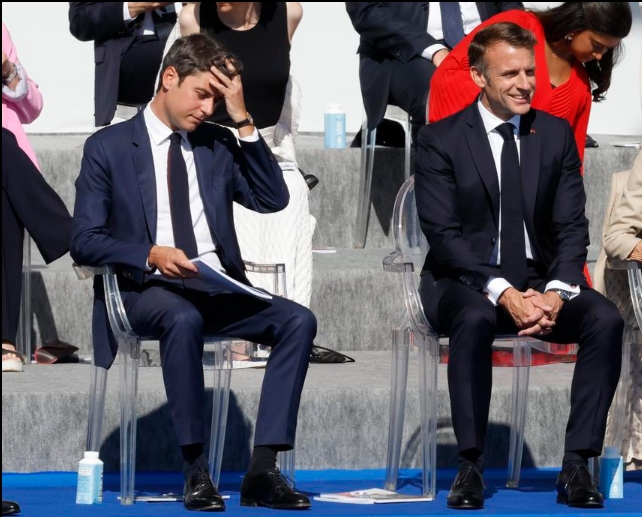
French President Emmanuel Macron (R) and Prime Minister Gabriel Attal attend the annual Bastille Day military parade in Paris, France, on July 14, 2024. (Photo by Henri Szwarc/Xinhua)
French President Emmanuel Macron has accepted Prime Minister Gabriel Attal's resignation, but asked him to stay as the head of a caretaker cabinet until the formation of a new administration.
PARIS, July 17 -- French President Emmanuel Macron has accepted Prime Minister Gabriel Attal's resignation, but asked him to stay as the head of a caretaker cabinet until the formation of a new administration, the French presidential office said Tuesday.
As caretakers, Attal and his governmental team can only oversee the normal operation of administration, and intervene in the event of an emergency. The caretaker government cannot initiate any new projects or laws. Due to the current ambiguous political situation, it cannot be ousted by a vote of no confidence.
Attal submitted his resignation to Macron on July 8 after the ruling party failed to secure a majority in the snap legislative elections. But later that day Macron asked him to stay on the post "for the moment" to ensure the country's stability.
The French president announced the dissolution of the National Assembly on June 9 and called for new legislative elections after his Renaissance party coalition suffered a heavy defeat in the European Parliament elections.
In the two rounds of legislative elections held on June 30 and July 7, Macron's centrist coalition finished second with 163 seats, trailing the left-wing parties' alliance, the New Popular Front (NFP), which secured a relative majority with 182 seats in the 577-member National Assembly.
The winner alliance of the legislative elections, the NFP, has not yet been able to propose a candidate to be the next prime minister. National Rally party Vice President Sebastien Chenu said the situation is a sign that the NFP "is not ready to govern."
This file photo shows French Prime Minister Gabriel Attal delivering a speech before the National Assembly in Paris, France, Jan. 30, 2024. (Photo by Jack Chan/Xinhua)
Macron's decision is seen as an attempt to secure votes for a centrist or right-wing speaker of the National Assembly. On Thursday, the elected deputies are expected to choose the speaker of the new National Assembly. According to the French electoral laws, ministers in office cannot cast their ballots. But with the resignation accepted, the 17 ministers who won a seat in parliament in the election can now vote on the distribution of leadership positions.
Attal said he would propose meetings with competing political groups "to move towards an action pact" on forming a new government.
But he ruled out any prospect of staying on himself.
"I do not aspire to be the next prime minister. I will not be the next prime minister," he told the broadcaster TFI.
"For this period to end as soon as possible, it is up to the Republican forces to work together to build unity around projects and actions in the service of the French people," Elysee said in a press release.
Succeeding Elisabeth Borne, Attal was nominated prime minister on Jan. 9 at the age of 34, becoming the youngest to hold the position in the history of the Fifth Republic.
Macron still has almost three years to go as president before elections in 2027, when far-right leader Marine Le Pen is expected to make a fresh bid for power.
There is no firm timeline for when Macron must name a new prime minister following parliamentary elections this month, which left the National Assembly with no dominant political bloc in power for the first time in France's modern republic.










